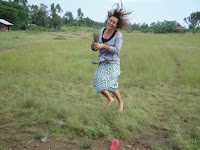I composed this blog several days ago but we have been without power since Sunday so haven't had a chance to tidy it up and publish it.
We rely on a car battery with a device called an inverter to charge our laptops, and first the battery ran out of juice and then the inverter gave up. It turned out to be just a fuse but it has taken us 4 days to sort it out.
I want to add some pictures to this but our internet connection is very slow so I shall try again another day.
I put a picture of our house in an earlier blog, but I want to share some of the facets of living here.
We rely on a car battery with a device called an inverter to charge our laptops, and first the battery ran out of juice and then the inverter gave up. It turned out to be just a fuse but it has taken us 4 days to sort it out.
I want to add some pictures to this but our internet connection is very slow so I shall try again another day.
I put a picture of our house in an earlier blog, but I want to share some of the facets of living here.
The house was built specially for the TAMTF volunteers and is of a better standard than most local housing. The house has 3 bedrooms, a main
living room, a storeroom and a “bathroom”.
The floors are concrete - so can be kept fairly clean. The outer walls
go right up to the roof – not always the case with local houses- but the inner
walls go to where the ceiling would be if we had one. The roof is corrugated iron, and does a
pretty good job of keeping the rain out. It has been severely tested recently
in some proper tropical thunderstorms, and only let through a few drips. It is however, very noisy in the rain –
something which I and my colleagues are familiar with working in Owen Block!
The bedrooms each have a single bed – actually surprisingly
comfortable – and a metal chair to put “stuff” on. We each have a mosquito net, a pillow,
blanket and sheets. Previous volunteers
have left the sheets, but we just have one pair per bed so have to hope it
doesn’t rain when they are washed.
 |
| Samina cooking |
The “bathroom” is a "wet room" with a drain hole in one corner
that water will drain from. We use a system of two bowls – fresh water in one
is scooped up with a jug and poured over oneself while standing in the other
bowl. The first jug of cold water is a
shock but it is very refreshing. It is surprising how little water you need to
wash all over including hair when you know every drop has been carried over
here. The toilet is about 40m away, I
won’t describe it.
The central room in the house has a small wooden table and 3
plastic garden chairs. We borrowed
chairs from the school when we hosted lunch for the teachers the other
day. We have a hurricane lamp to use
after dark – it gets dark by 7pm – and we use torches. We are nearly always in bed before 10, often
just after 9, as reading by torchlight is difficult and attracts moths and
insects. We make up for it by getting up early.
Breakfast is usually toast and coffee, and fruit –mango this
morning, pineapple or papaya other days.
During term time we can eat with the teachers – ugali and
kale, sometimes with meat broth, eaten with fingers. Ugali is hard to describe
for anyone not familiar with native African food. Made with maize, and cooked to a stodgy lump,
it forms the basis of most meals. I
can’t say I have learned to love it but it is quite acceptable and I can eat
enough of it not to offend anyone when we go visiting.
As the school is closed now we have to make our own lunch as
well as evening meal.
We were invited to
lunch with one of the teachers last Saturday.
She had cooked a chicken for us (eggs for Samina) which helped the ugali
and kale go down well.
It’s a simple life but we keep well and have all the
basics. We have a better standard of
living than the people around us so no complaints.









